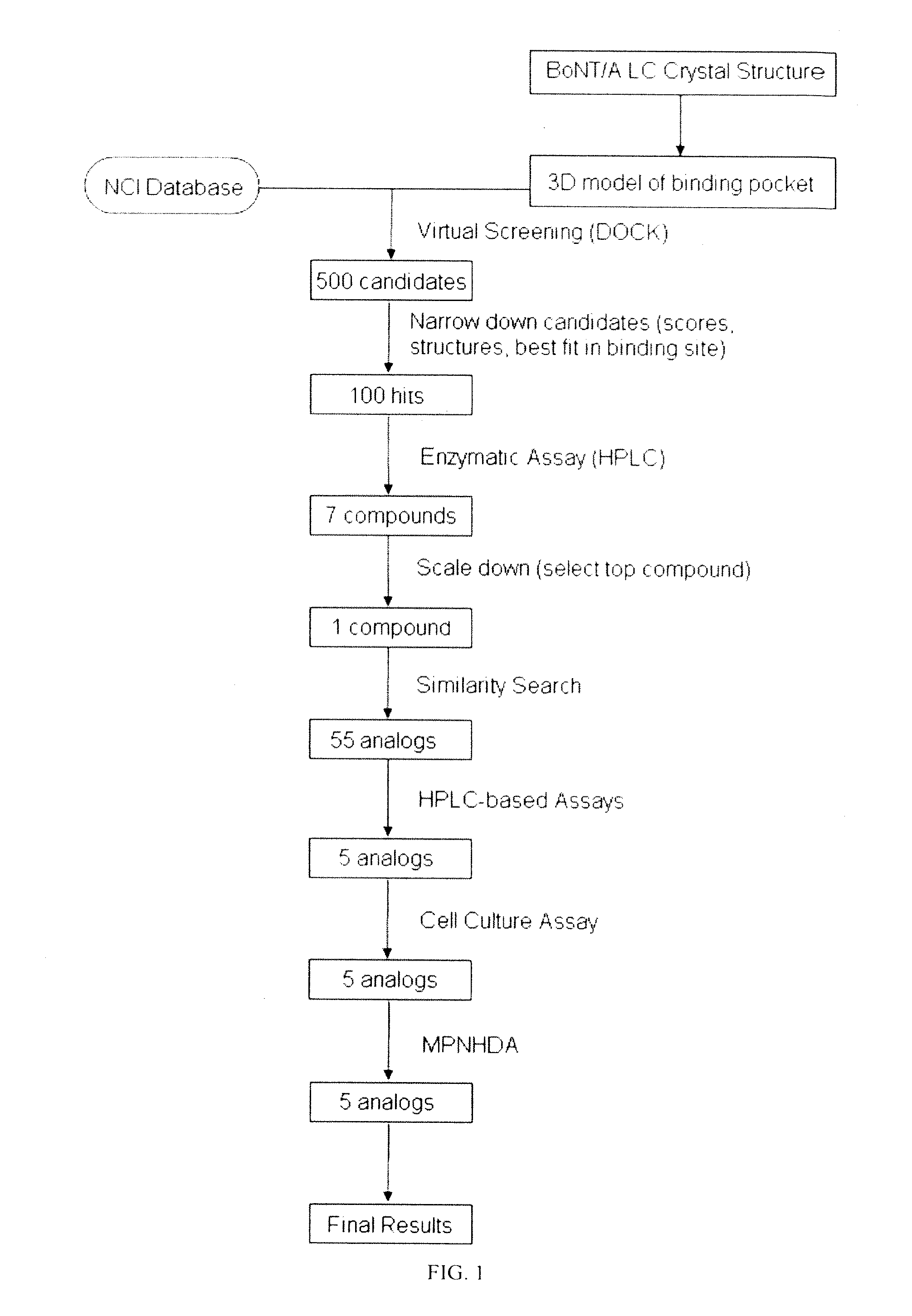Small molecule inhibitors of botulinum neurotoxins
a botulinum neurotoxins and small molecule technology, applied in the field of inhibiting botulinum neurotoxins, can solve the problems of limited availability, short window of application, and variability in lot-to-lot potency, and achieve the effects of short window of application, and limited availability
- Summary
- Abstract
- Description
- Claims
- Application Information
AI Technical Summary
Benefits of technology
Problems solved by technology
Method used
Image
Examples
example 1
Identification of Small-Molecule Inhibitors of Botulinum Neurotoxins
[0069]The flow chart shown in FIG. 1 outlines the overall strategy for the identification of small-molecule inhibitors of BoNT / A. Focus was placed on serotype A since it is the most prevalent and well-studied among the various serotypes in human intoxication. In silico screening was used to identify BoNT / A inhibitors. Selected compounds were tested for inhibition of the protease activity of BoNT / A LC. Compounds that passed the HPLC screens were advanced to in vitro and ex vivo assays.
Virtual Screening of the NCI Database
[0070]The NCI database was chosen for virtual screening on the basis of the following considerations. First, it constitutes the largest freely available, public domain chemical structure database with >250,000 compounds (48). Second, it contains a high number of unique and structurally diverse compounds. Thus, the NCI database provides an opportunity to discover lead compounds (48).
[0071]The compound...
example 2
Inhibition in Cell-Based Assay
[0078]To this point, it has been demonstrated that five compounds inhibit the enzymatic activity of BoNT / A in vitro. To examine the likelihood that these compounds might be useful antibotulinum therapeutics, studies were performed in other systems. One of these used murine neuroblastoma N2a cells to evaluate the ability of these compounds to protect BoNT / A-mediated cleavage of intracellular SNAP-25. BoNT / A binds to N2a cells and the translocated LC cleaves SNAP-25 in these cells. The extent of cleavage of SNAP-25 in N2a cells by BoNT / A was determined by western blot analysis using monoclonal antibodies against SNAP-25. As shown in FIG. 2B, all five lead analogs at 15 μM, exhibited complete protection of BoNT / A-mediated SNAP-25. At 10 μM three of these compounds (CB 7967495, NSC 84094, CB 7969312) showed near-to-complete inhibition of SNAP-25 cleavage while the other two (NSC 84096 and CB 7968218) afforded 66% and 68% protection, respectively (FIG. 2C).
example 3
Activity in Mouse Phrenic Nerve Hemidiaphragm Assay
[0079]Encouraged by these findings, the efficacy of these analogs was examined at the tissue level using mouse phrenic nerve hemidiaphragm preparations whose intact neuromuscular junction permits the monitoring of the effectiveness of an inhibitor by recording muscle twitch tension. In the ex-vivo mouse phrenic nerve hemidiaphragm assay (MPNHDA), the time to onset of neuromuscular block is a concentration-sensitive event, with blockade occurring earlier with higher toxin concentrations (13, 40, 41). Changes in the onset of muscle paralysis with a fixed concentration of toxin are used to indicate the activity of candidate BoNT therapeutics.
[0080]Results from MPNHDA experiments demonstrated that applying effective concentrations of compounds significantly delayed (P2 (SEQ ID NO: 1) (Ki=1.9 μM) (38) did not cause a delay in paralytic time at 20 μM, and showed muscle twitch-tension time courses that were similar to that of BoNT / A alone ...
PUM
| Property | Measurement | Unit |
|---|---|---|
| pH | aaaaa | aaaaa |
| flow rate | aaaaa | aaaaa |
| concentration | aaaaa | aaaaa |
Abstract
Description
Claims
Application Information
 Login to View More
Login to View More - R&D
- Intellectual Property
- Life Sciences
- Materials
- Tech Scout
- Unparalleled Data Quality
- Higher Quality Content
- 60% Fewer Hallucinations
Browse by: Latest US Patents, China's latest patents, Technical Efficacy Thesaurus, Application Domain, Technology Topic, Popular Technical Reports.
© 2025 PatSnap. All rights reserved.Legal|Privacy policy|Modern Slavery Act Transparency Statement|Sitemap|About US| Contact US: help@patsnap.com



